Differences between Management and Financial Accounting
VerifiedAdded on 2023/01/11
|8
|1330
|72
AI Summary
This report discusses the differences between management accounting and financial accounting, including their objectives, techniques, and usefulness for financial information users. It also explores the role of these accounting practices in decision making, identification of profitability, comparison of business performance, future policies, taxation and regulation, creation of budgets, informing investment decisions, and risk measurement.
Contribute Materials
Your contribution can guide someone’s learning journey. Share your
documents today.

BUSINESS FINANCE
1
1
Secure Best Marks with AI Grader
Need help grading? Try our AI Grader for instant feedback on your assignments.
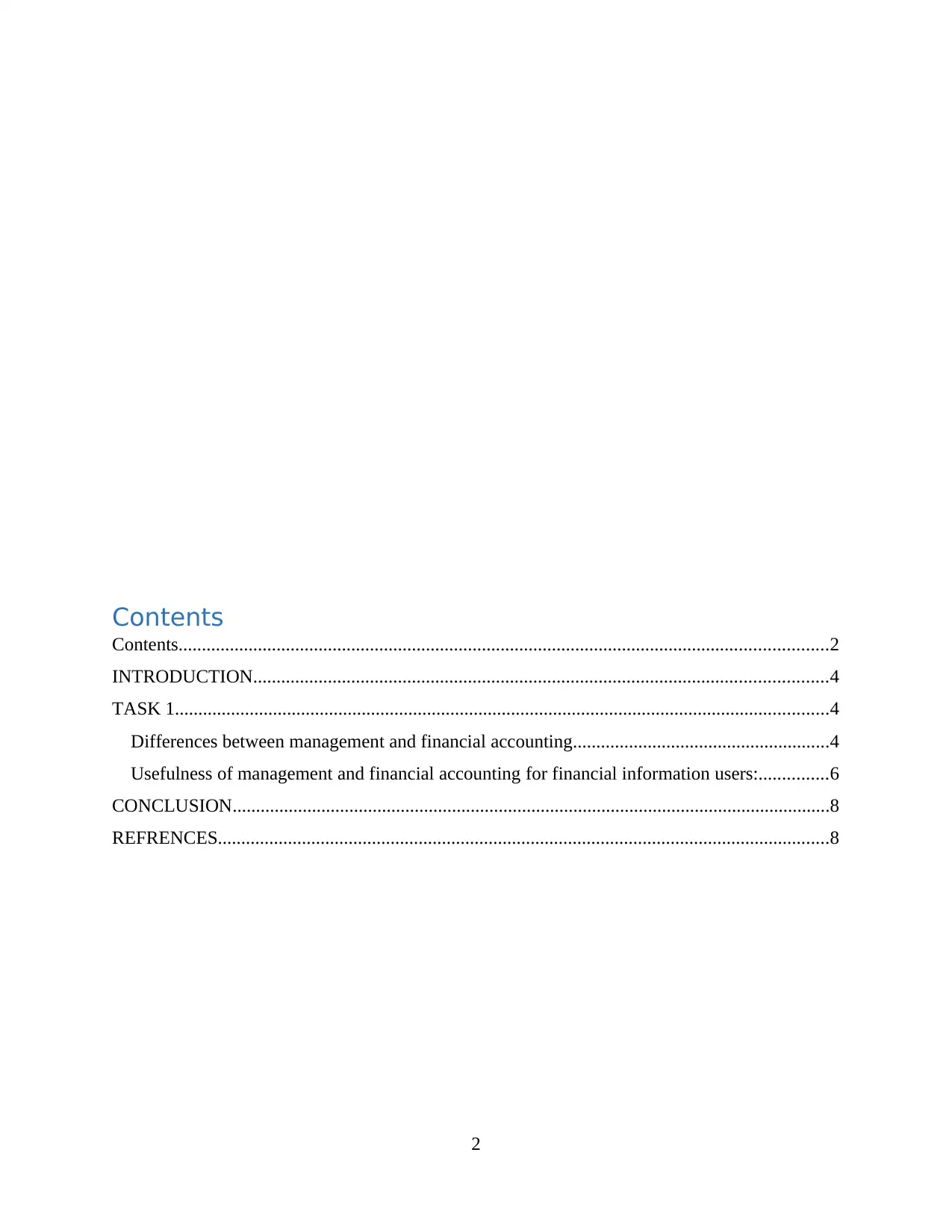
Contents
Contents...........................................................................................................................................2
INTRODUCTION...........................................................................................................................4
TASK 1............................................................................................................................................4
Differences between management and financial accounting.......................................................4
Usefulness of management and financial accounting for financial information users:...............6
CONCLUSION................................................................................................................................8
REFRENCES...................................................................................................................................8
2
Contents...........................................................................................................................................2
INTRODUCTION...........................................................................................................................4
TASK 1............................................................................................................................................4
Differences between management and financial accounting.......................................................4
Usefulness of management and financial accounting for financial information users:...............6
CONCLUSION................................................................................................................................8
REFRENCES...................................................................................................................................8
2
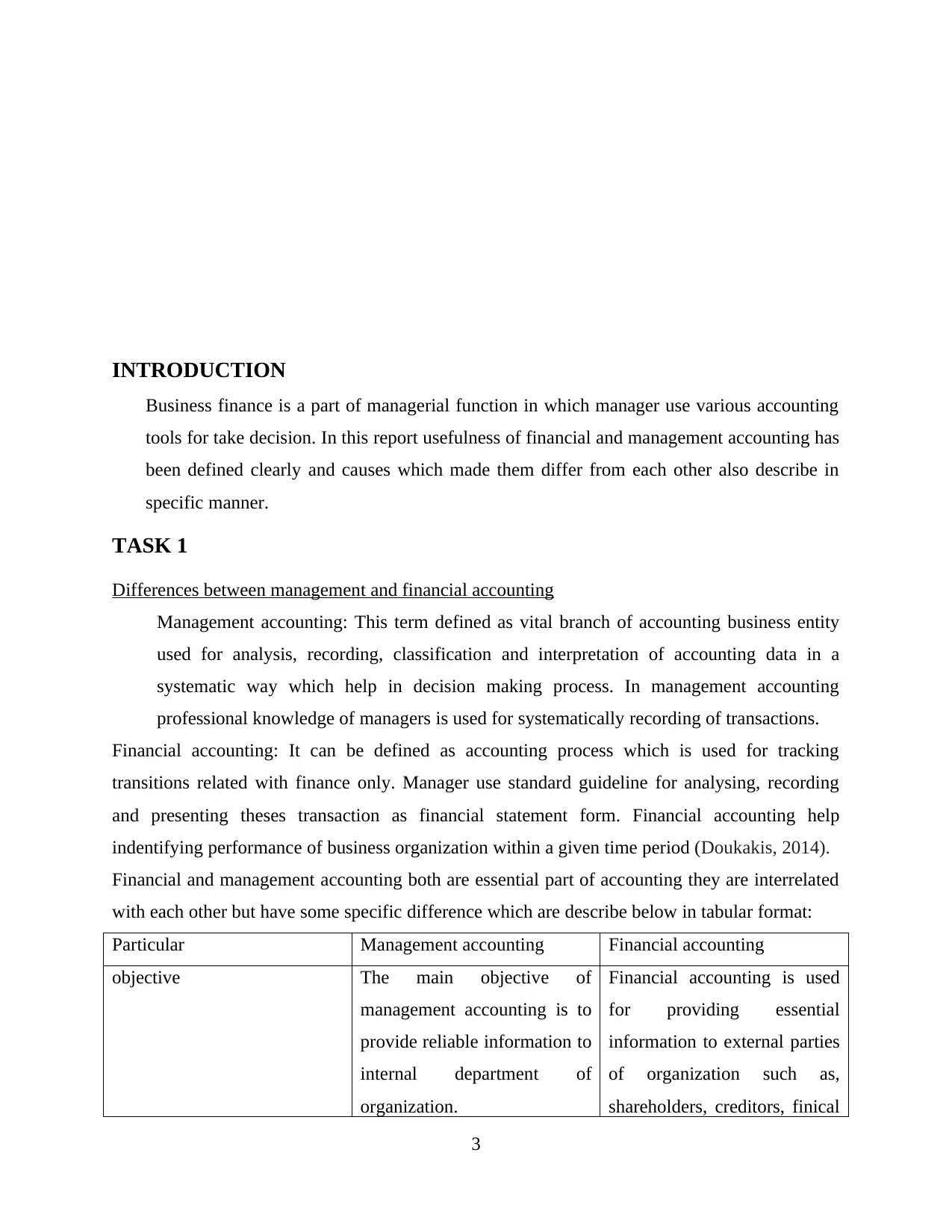
INTRODUCTION
Business finance is a part of managerial function in which manager use various accounting
tools for take decision. In this report usefulness of financial and management accounting has
been defined clearly and causes which made them differ from each other also describe in
specific manner.
TASK 1
Differences between management and financial accounting
Management accounting: This term defined as vital branch of accounting business entity
used for analysis, recording, classification and interpretation of accounting data in a
systematic way which help in decision making process. In management accounting
professional knowledge of managers is used for systematically recording of transactions.
Financial accounting: It can be defined as accounting process which is used for tracking
transitions related with finance only. Manager use standard guideline for analysing, recording
and presenting theses transaction as financial statement form. Financial accounting help
indentifying performance of business organization within a given time period (Doukakis, 2014).
Financial and management accounting both are essential part of accounting they are interrelated
with each other but have some specific difference which are describe below in tabular format:
Particular Management accounting Financial accounting
objective The main objective of
management accounting is to
provide reliable information to
internal department of
organization.
Financial accounting is used
for providing essential
information to external parties
of organization such as,
shareholders, creditors, finical
3
Business finance is a part of managerial function in which manager use various accounting
tools for take decision. In this report usefulness of financial and management accounting has
been defined clearly and causes which made them differ from each other also describe in
specific manner.
TASK 1
Differences between management and financial accounting
Management accounting: This term defined as vital branch of accounting business entity
used for analysis, recording, classification and interpretation of accounting data in a
systematic way which help in decision making process. In management accounting
professional knowledge of managers is used for systematically recording of transactions.
Financial accounting: It can be defined as accounting process which is used for tracking
transitions related with finance only. Manager use standard guideline for analysing, recording
and presenting theses transaction as financial statement form. Financial accounting help
indentifying performance of business organization within a given time period (Doukakis, 2014).
Financial and management accounting both are essential part of accounting they are interrelated
with each other but have some specific difference which are describe below in tabular format:
Particular Management accounting Financial accounting
objective The main objective of
management accounting is to
provide reliable information to
internal department of
organization.
Financial accounting is used
for providing essential
information to external parties
of organization such as,
shareholders, creditors, finical
3
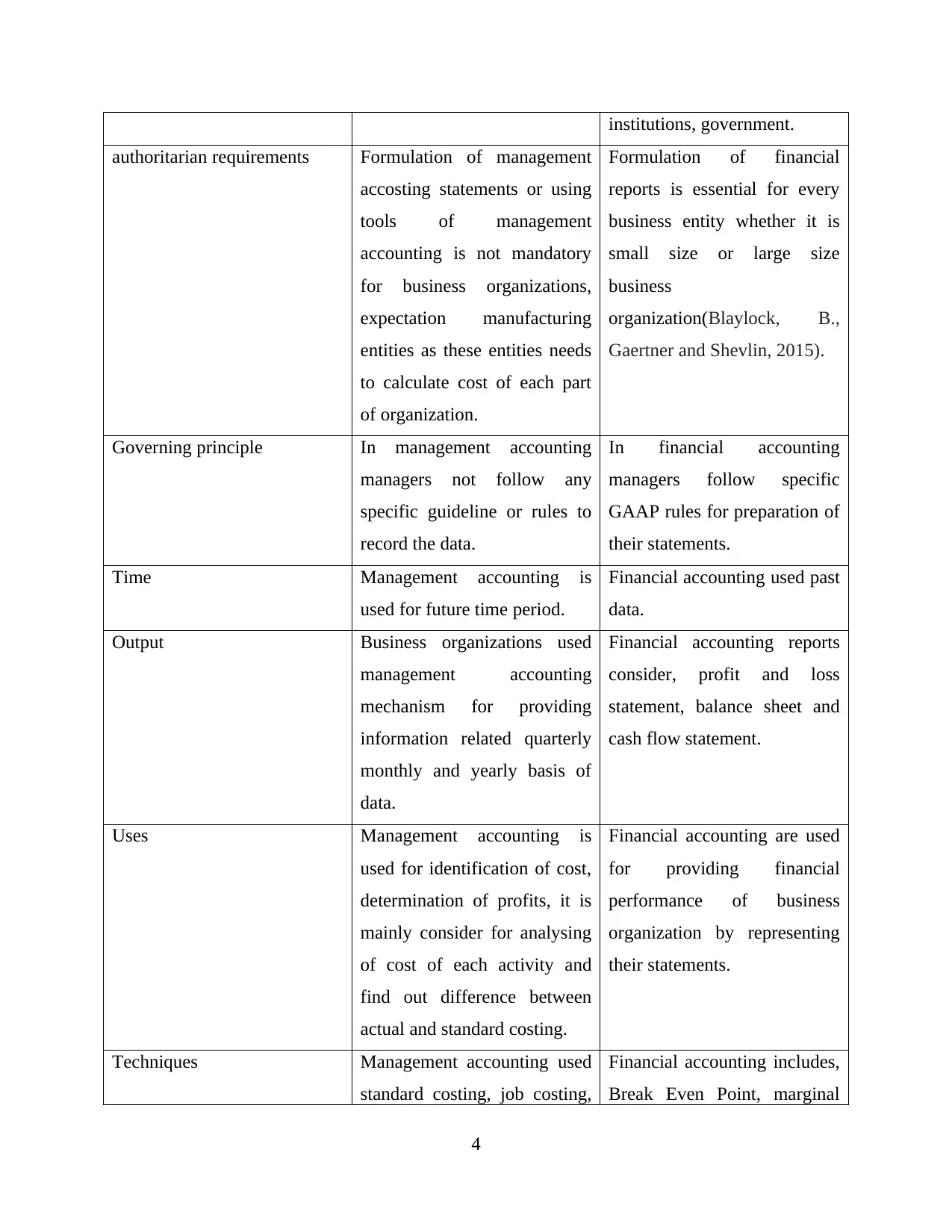
institutions, government.
authoritarian requirements Formulation of management
accosting statements or using
tools of management
accounting is not mandatory
for business organizations,
expectation manufacturing
entities as these entities needs
to calculate cost of each part
of organization.
Formulation of financial
reports is essential for every
business entity whether it is
small size or large size
business
organization(Blaylock, B.,
Gaertner and Shevlin, 2015).
Governing principle In management accounting
managers not follow any
specific guideline or rules to
record the data.
In financial accounting
managers follow specific
GAAP rules for preparation of
their statements.
Time Management accounting is
used for future time period.
Financial accounting used past
data.
Output Business organizations used
management accounting
mechanism for providing
information related quarterly
monthly and yearly basis of
data.
Financial accounting reports
consider, profit and loss
statement, balance sheet and
cash flow statement.
Uses Management accounting is
used for identification of cost,
determination of profits, it is
mainly consider for analysing
of cost of each activity and
find out difference between
actual and standard costing.
Financial accounting are used
for providing financial
performance of business
organization by representing
their statements.
Techniques Management accounting used
standard costing, job costing,
Financial accounting includes,
Break Even Point, marginal
4
authoritarian requirements Formulation of management
accosting statements or using
tools of management
accounting is not mandatory
for business organizations,
expectation manufacturing
entities as these entities needs
to calculate cost of each part
of organization.
Formulation of financial
reports is essential for every
business entity whether it is
small size or large size
business
organization(Blaylock, B.,
Gaertner and Shevlin, 2015).
Governing principle In management accounting
managers not follow any
specific guideline or rules to
record the data.
In financial accounting
managers follow specific
GAAP rules for preparation of
their statements.
Time Management accounting is
used for future time period.
Financial accounting used past
data.
Output Business organizations used
management accounting
mechanism for providing
information related quarterly
monthly and yearly basis of
data.
Financial accounting reports
consider, profit and loss
statement, balance sheet and
cash flow statement.
Uses Management accounting is
used for identification of cost,
determination of profits, it is
mainly consider for analysing
of cost of each activity and
find out difference between
actual and standard costing.
Financial accounting are used
for providing financial
performance of business
organization by representing
their statements.
Techniques Management accounting used
standard costing, job costing,
Financial accounting includes,
Break Even Point, marginal
4
Secure Best Marks with AI Grader
Need help grading? Try our AI Grader for instant feedback on your assignments.
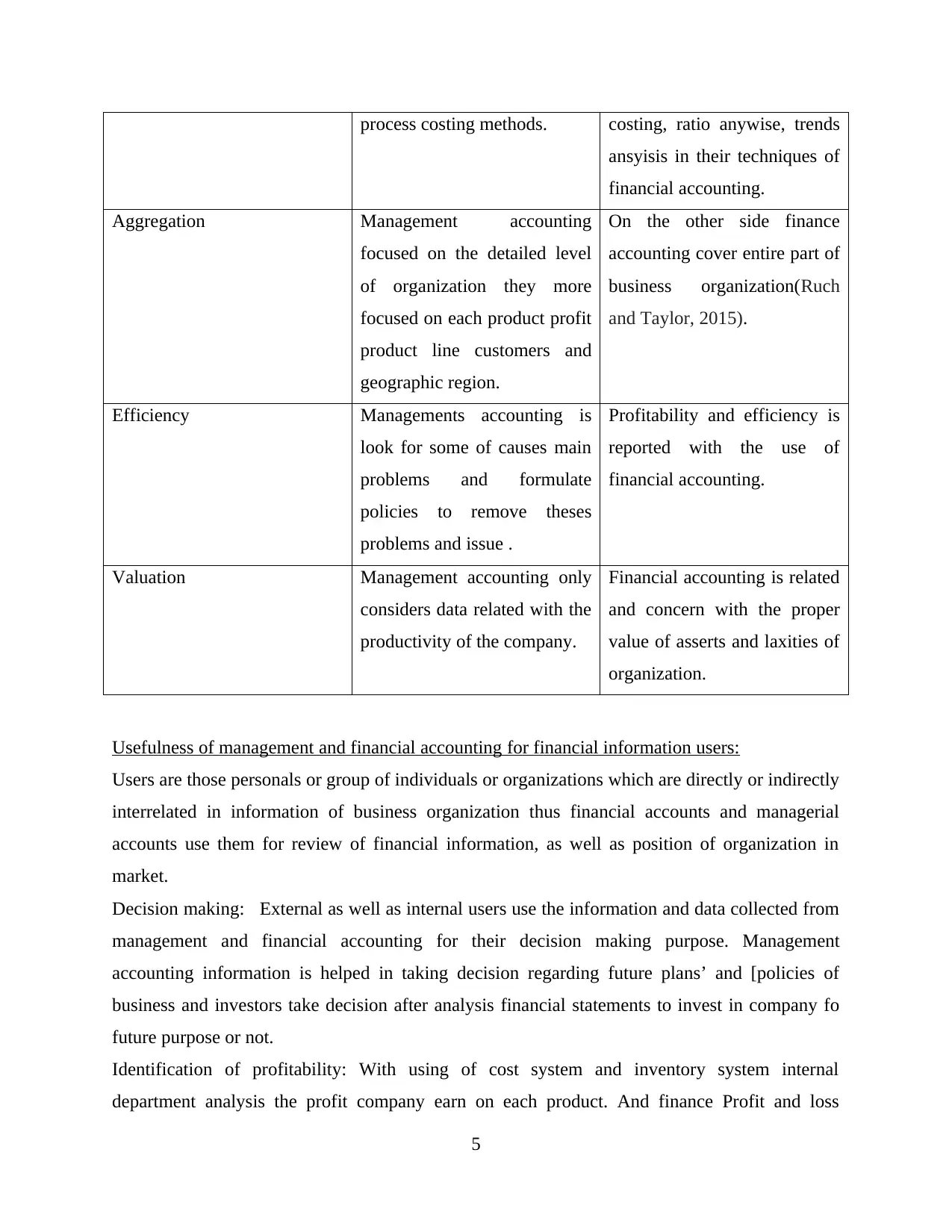
process costing methods. costing, ratio anywise, trends
ansyisis in their techniques of
financial accounting.
Aggregation Management accounting
focused on the detailed level
of organization they more
focused on each product profit
product line customers and
geographic region.
On the other side finance
accounting cover entire part of
business organization(Ruch
and Taylor, 2015).
Efficiency Managements accounting is
look for some of causes main
problems and formulate
policies to remove theses
problems and issue .
Profitability and efficiency is
reported with the use of
financial accounting.
Valuation Management accounting only
considers data related with the
productivity of the company.
Financial accounting is related
and concern with the proper
value of asserts and laxities of
organization.
Usefulness of management and financial accounting for financial information users:
Users are those personals or group of individuals or organizations which are directly or indirectly
interrelated in information of business organization thus financial accounts and managerial
accounts use them for review of financial information, as well as position of organization in
market.
Decision making: External as well as internal users use the information and data collected from
management and financial accounting for their decision making purpose. Management
accounting information is helped in taking decision regarding future plans’ and [policies of
business and investors take decision after analysis financial statements to invest in company fo
future purpose or not.
Identification of profitability: With using of cost system and inventory system internal
department analysis the profit company earn on each product. And finance Profit and loss
5
ansyisis in their techniques of
financial accounting.
Aggregation Management accounting
focused on the detailed level
of organization they more
focused on each product profit
product line customers and
geographic region.
On the other side finance
accounting cover entire part of
business organization(Ruch
and Taylor, 2015).
Efficiency Managements accounting is
look for some of causes main
problems and formulate
policies to remove theses
problems and issue .
Profitability and efficiency is
reported with the use of
financial accounting.
Valuation Management accounting only
considers data related with the
productivity of the company.
Financial accounting is related
and concern with the proper
value of asserts and laxities of
organization.
Usefulness of management and financial accounting for financial information users:
Users are those personals or group of individuals or organizations which are directly or indirectly
interrelated in information of business organization thus financial accounts and managerial
accounts use them for review of financial information, as well as position of organization in
market.
Decision making: External as well as internal users use the information and data collected from
management and financial accounting for their decision making purpose. Management
accounting information is helped in taking decision regarding future plans’ and [policies of
business and investors take decision after analysis financial statements to invest in company fo
future purpose or not.
Identification of profitability: With using of cost system and inventory system internal
department analysis the profit company earn on each product. And finance Profit and loss
5
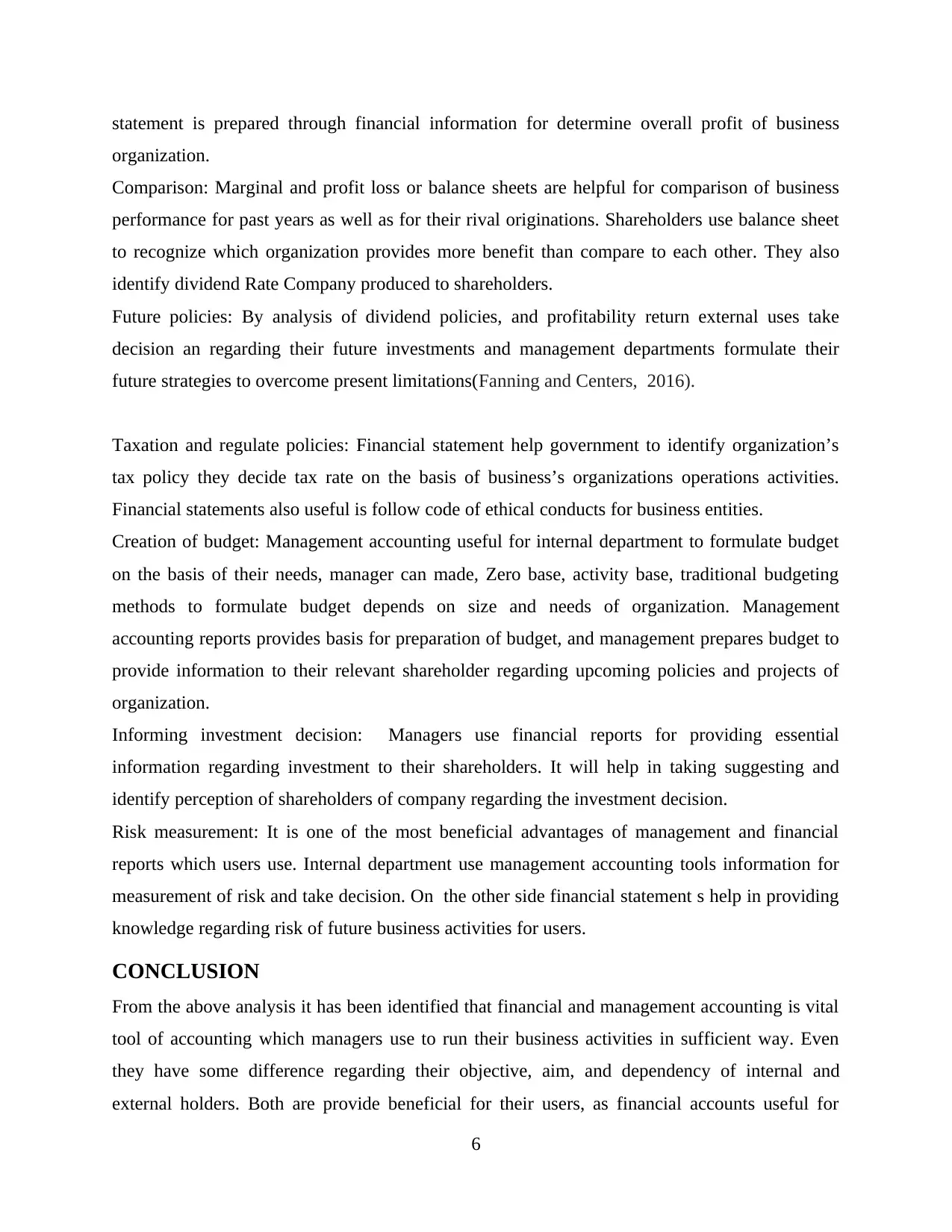
statement is prepared through financial information for determine overall profit of business
organization.
Comparison: Marginal and profit loss or balance sheets are helpful for comparison of business
performance for past years as well as for their rival originations. Shareholders use balance sheet
to recognize which organization provides more benefit than compare to each other. They also
identify dividend Rate Company produced to shareholders.
Future policies: By analysis of dividend policies, and profitability return external uses take
decision an regarding their future investments and management departments formulate their
future strategies to overcome present limitations(Fanning and Centers, 2016).
Taxation and regulate policies: Financial statement help government to identify organization’s
tax policy they decide tax rate on the basis of business’s organizations operations activities.
Financial statements also useful is follow code of ethical conducts for business entities.
Creation of budget: Management accounting useful for internal department to formulate budget
on the basis of their needs, manager can made, Zero base, activity base, traditional budgeting
methods to formulate budget depends on size and needs of organization. Management
accounting reports provides basis for preparation of budget, and management prepares budget to
provide information to their relevant shareholder regarding upcoming policies and projects of
organization.
Informing investment decision: Managers use financial reports for providing essential
information regarding investment to their shareholders. It will help in taking suggesting and
identify perception of shareholders of company regarding the investment decision.
Risk measurement: It is one of the most beneficial advantages of management and financial
reports which users use. Internal department use management accounting tools information for
measurement of risk and take decision. On the other side financial statement s help in providing
knowledge regarding risk of future business activities for users.
CONCLUSION
From the above analysis it has been identified that financial and management accounting is vital
tool of accounting which managers use to run their business activities in sufficient way. Even
they have some difference regarding their objective, aim, and dependency of internal and
external holders. Both are provide beneficial for their users, as financial accounts useful for
6
organization.
Comparison: Marginal and profit loss or balance sheets are helpful for comparison of business
performance for past years as well as for their rival originations. Shareholders use balance sheet
to recognize which organization provides more benefit than compare to each other. They also
identify dividend Rate Company produced to shareholders.
Future policies: By analysis of dividend policies, and profitability return external uses take
decision an regarding their future investments and management departments formulate their
future strategies to overcome present limitations(Fanning and Centers, 2016).
Taxation and regulate policies: Financial statement help government to identify organization’s
tax policy they decide tax rate on the basis of business’s organizations operations activities.
Financial statements also useful is follow code of ethical conducts for business entities.
Creation of budget: Management accounting useful for internal department to formulate budget
on the basis of their needs, manager can made, Zero base, activity base, traditional budgeting
methods to formulate budget depends on size and needs of organization. Management
accounting reports provides basis for preparation of budget, and management prepares budget to
provide information to their relevant shareholder regarding upcoming policies and projects of
organization.
Informing investment decision: Managers use financial reports for providing essential
information regarding investment to their shareholders. It will help in taking suggesting and
identify perception of shareholders of company regarding the investment decision.
Risk measurement: It is one of the most beneficial advantages of management and financial
reports which users use. Internal department use management accounting tools information for
measurement of risk and take decision. On the other side financial statement s help in providing
knowledge regarding risk of future business activities for users.
CONCLUSION
From the above analysis it has been identified that financial and management accounting is vital
tool of accounting which managers use to run their business activities in sufficient way. Even
they have some difference regarding their objective, aim, and dependency of internal and
external holders. Both are provide beneficial for their users, as financial accounts useful for
6
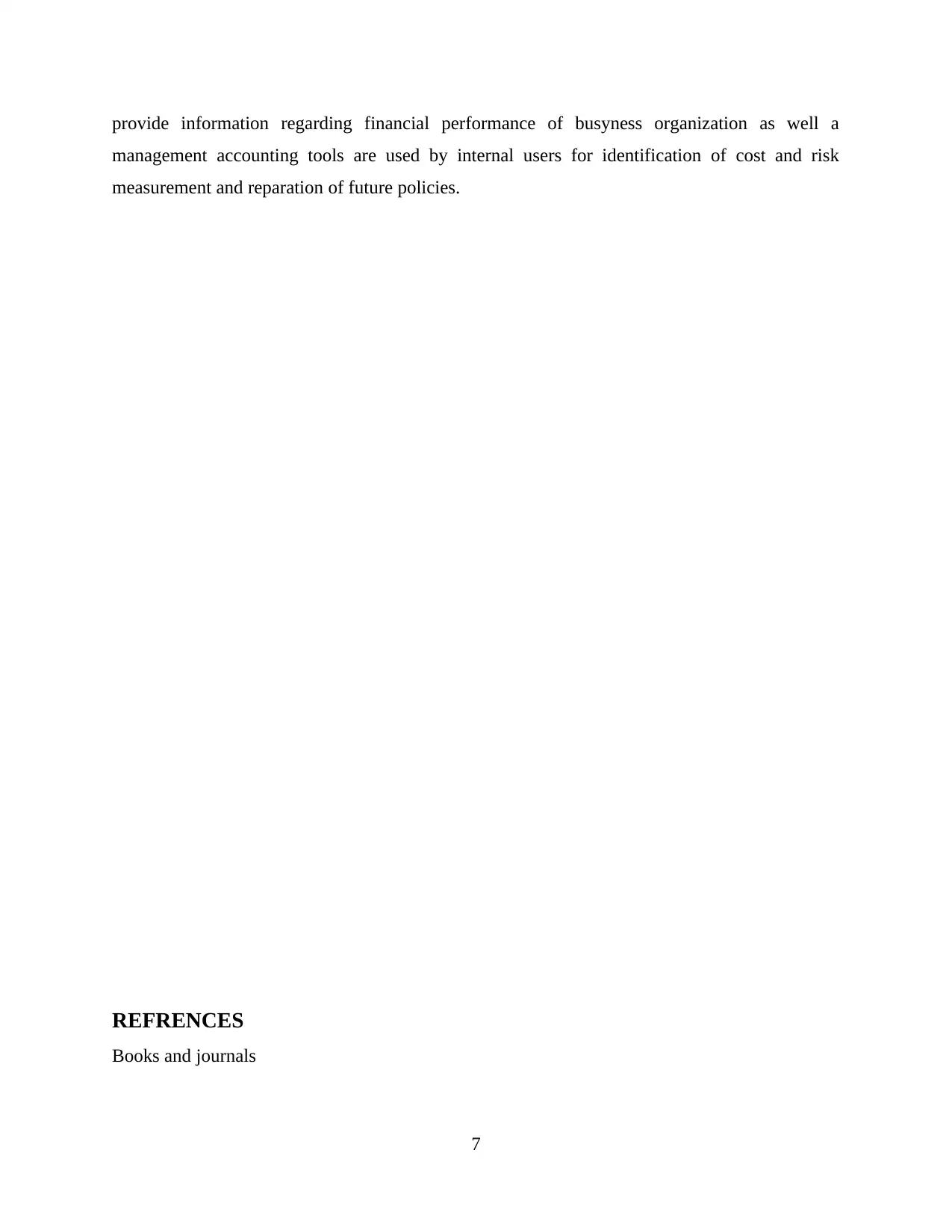
provide information regarding financial performance of busyness organization as well a
management accounting tools are used by internal users for identification of cost and risk
measurement and reparation of future policies.
REFRENCES
Books and journals
7
management accounting tools are used by internal users for identification of cost and risk
measurement and reparation of future policies.
REFRENCES
Books and journals
7
Paraphrase This Document
Need a fresh take? Get an instant paraphrase of this document with our AI Paraphraser
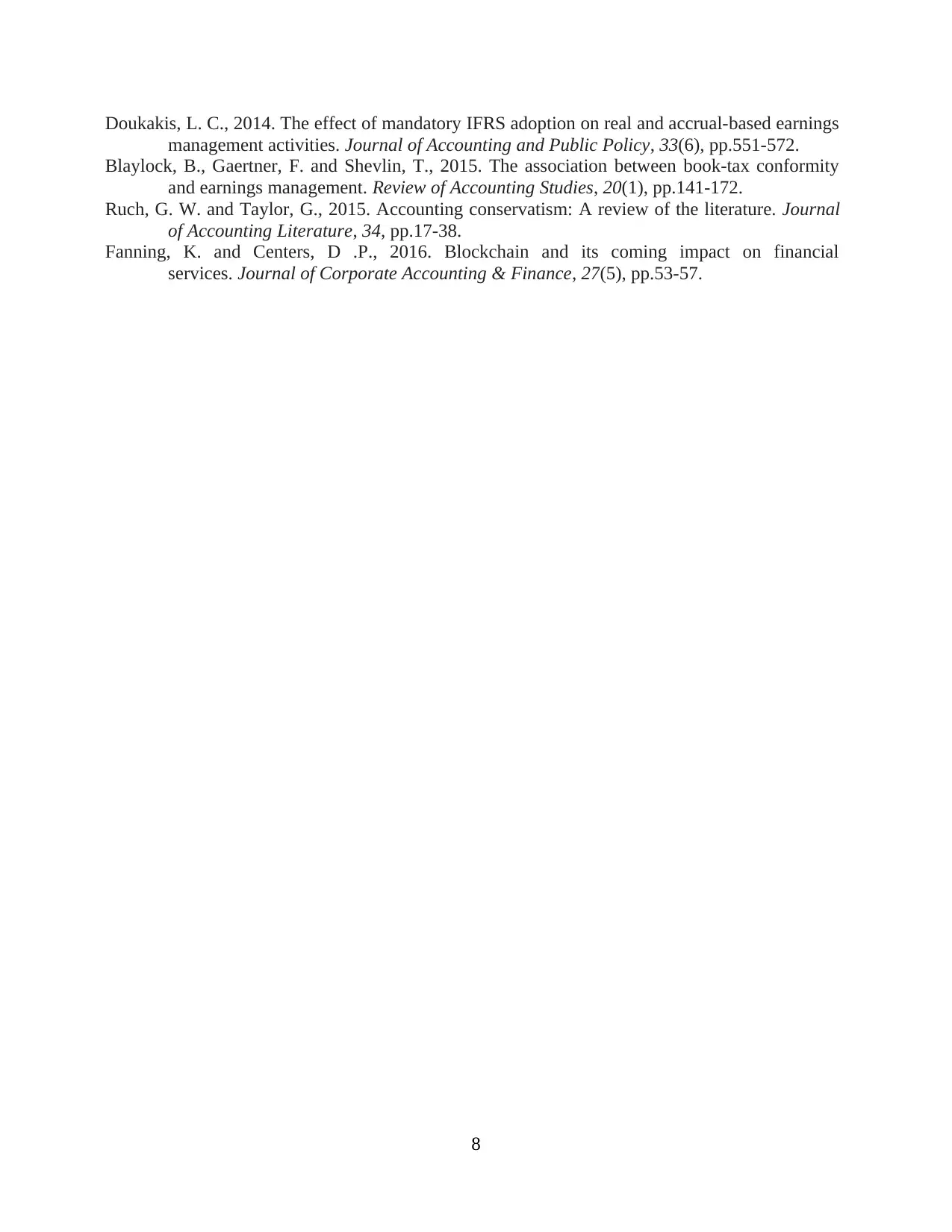
Doukakis, L. C., 2014. The effect of mandatory IFRS adoption on real and accrual-based earnings
management activities. Journal of Accounting and Public Policy, 33(6), pp.551-572.
Blaylock, B., Gaertner, F. and Shevlin, T., 2015. The association between book-tax conformity
and earnings management. Review of Accounting Studies, 20(1), pp.141-172.
Ruch, G. W. and Taylor, G., 2015. Accounting conservatism: A review of the literature. Journal
of Accounting Literature, 34, pp.17-38.
Fanning, K. and Centers, D .P., 2016. Blockchain and its coming impact on financial
services. Journal of Corporate Accounting & Finance, 27(5), pp.53-57.
8
management activities. Journal of Accounting and Public Policy, 33(6), pp.551-572.
Blaylock, B., Gaertner, F. and Shevlin, T., 2015. The association between book-tax conformity
and earnings management. Review of Accounting Studies, 20(1), pp.141-172.
Ruch, G. W. and Taylor, G., 2015. Accounting conservatism: A review of the literature. Journal
of Accounting Literature, 34, pp.17-38.
Fanning, K. and Centers, D .P., 2016. Blockchain and its coming impact on financial
services. Journal of Corporate Accounting & Finance, 27(5), pp.53-57.
8
1 out of 8
Related Documents
Your All-in-One AI-Powered Toolkit for Academic Success.
+13062052269
info@desklib.com
Available 24*7 on WhatsApp / Email
![[object Object]](/_next/static/media/star-bottom.7253800d.svg)
Unlock your academic potential
© 2024 | Zucol Services PVT LTD | All rights reserved.





